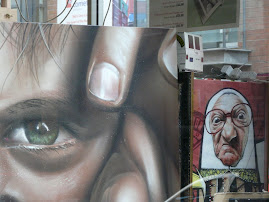
A certain someone mentioned today that I hadn't put anything up on my blog for a while... god, I hate it when people are right!! :) So, I thought I'd share with you what I got up to today at an event which looked at Reporting Poverty in the UK
One of the most interesting things that was looked at was how poverty is being reported in the media. Recent research shows that basically not a lot of poverty is being reported in the UK and even when it is it's linked in to other 'social problems' such as crime. There is a tendency to 'other' those who struggle with poverty, and report statistics rater than focus on than the very real experience of poverty. The fear is that this kind of reporting creates a distance between those who live in poverty (out there...) and the rest of us who may have had very limited personal experience.
There is also a distinct lack of empathy which supports the notion of a 'deserving poor' who have no one to blame but their own laziness. Quite simply, this isn't accurate and just reflects the journalists limited range of views as well as their white/upper middle-class, sheltered background.
In the current media environment, there is a tendency for journalists to hold certain news as newsworthy and others as simply not interesting. This means that unless some new report or government initiative has just emerged, journalists (and more importantly their editors) just don't have the time/space for a well-written, and important piece on poverty. To tackle this, the third sector needs to play a more active role in setting the agenda and co-ordinating with other charities and organisations to secure this.
Useful things we can do right now:
1. Take time to really listen to and understand the person you're interviewing- realise that trust needs to be built as there is a tendency for the media to flood an area, trash it in the papers and leave that town/city suffering from a bad reputation. This makes people less likely to trust any journalists.
2. Understanding between Media and Third Sector; A practical problem was the lack of understanding between these organisations. For example a lot of charities don't inform media outlets about their events early enough, or provide the right sort of information and a relevant case study. Equally, media outlets don't realise that the charities role is to protect their clients from any potential harm and that they often operate with very limited resources.
3. Language speaks; think carefully about the language that you use in articles about poverty. Don't cover up issues in complex terms and phrases, but also be sensitive about the impact that your work can have on the people directly involved and the perceptions it will create. For example, someone stated that there is no point in talking about fuel poverty, child poverty and social exclusion as separate topics as they are all outcomes/side-effects of plain-old-poverty.
Interesting points to keep in mind:
*Disabled people are twice as likely to live in poverty.
*People can be poor in spirit or physically poor. The fact is, physical poverty is likely to lead to spiritual poverty.
*Rural poverty tends to be ignored and marginalised in favour of the stereotype which places poverty in an urban context.



No comments:
Post a Comment